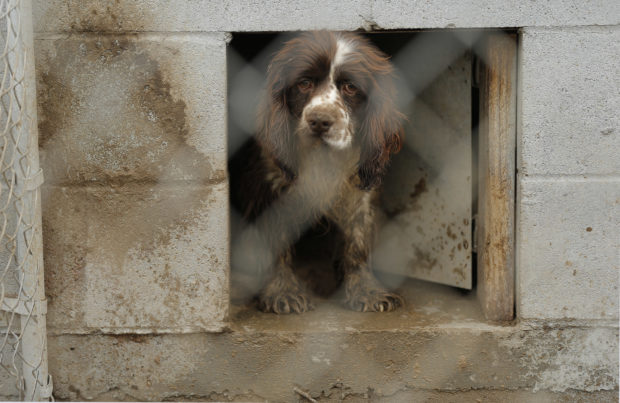
The USDA is not reporting publicly the names or identities of puppy mills that have been issued a warning or found with egregious violations, including those with sick, injured and emaciated dogs. Photo by Brandon Wade/AP Images for The HSUS
A recent article in the Washington Post took a look at the notion of irresponsible rescues – specifically, self-described pet rescue groups that purchase breeder dogs at puppy mill auctions, based on the premise that they are “used up” and therefore being rescued, not purchased. Reporter Kim Kavin studied the invoices from the two big dog auctions in the country over a 10-year period and found that 86 organizations identifying as rescue groups had bought about 5,700 dogs since 2009 – an average of roughly 50 dogs per month.
The article caused some readers to suggest that rescues should be regulated in the same way as breeders are. In fact, the U.S. Department of Agriculture quickly sent out a reminder that it reserves the right to regulate dealers who buy and “sell” dogs, even if those sales are simply nonprofit adoption fees. We’ve even seen a Farm Bill amendment proposed to address imports of rescued dogs from other countries.
It’s pretty clear to us at the Humane Society of the United States that this kind of story is the result of a whisper-down-the-lane campaign that seeks to disparage rescue groups and shelters. Make no mistake, we are opposed to purchasing dogs at these auctions, regardless of whether the purchase is made by a breeder or a rescue. But the fact is that fewer than one percent of the rescue groups in the country are involved in patronizing dog auctions. The other 99 percent are doing the selfless work of rehoming lost, abused and abandoned animals in need.
Here’s what is really going on. The puppy mill industry has attempted to focus attention on a few questionable rescues in an attempt to draw the public’s scrutiny away from the horrific cruelties of puppy mills. In the context of the larger crisis related to commercial dog breeding, this issue barely registers on the radar: puppy mills collectively churn out an average of 125,000 puppies a month.
Under the circumstances, it would be odd for the USDA to get more involved in the scrutiny and regulation of pet rescues. Over the past year, the agency has backed off on shutting down the very worst puppy mills in the country. The USDA has not revoked a single pet breeder license since before May 1, 2017, compared to 2016, when it revoked at least nine dog breeder licenses.
The USDA and the puppy mill industry aren’t doing nearly enough to address the bad apples in the dog breeding world — in fact, they’re falling down on the job. The USDA isn’t even bothering to report publicly the names or identities of puppy mills that have been issued a warning or found with egregious violations, including those with sick, injured and emaciated dogs, as our fight against its massive data purge continues. The USDA has even put forth a disastrous proposal that could allow groups like the American Kennel Club, which routinely oppose laws that would regulate puppy mills, to take over some of the USDA’s inspection responsibilities.
Pet rescue groups that buy dogs at auctions should understand that they are not helping. This practice perpetuates puppy mills by putting money in the pockets of a notoriously cruel industry, effectively buying cast-off animals and helping to subsidize more cruelty.
In all of this, we see the hand of puppy millers who want to obstruct animal rescue in all of its forms, while seeking to give their own cruel industry a free skate. The Humane Society of the United States is wholly focused on eliminating the cruel mass breeding industry and we’re supportive of responsible breeders, as we have demonstrated repeatedly. We’re also supportive of responsible animal rescue work, wherever it occurs, and through our annual conference, Animal Care Expo, and our Adopters Welcome guide, we continue to promote best practices for both shelter and rescue organizations. The folks pointing their fingers at small problems within animal rescue, or the transport of animals from state to state or from country to country, are pursuing a strategy of gaslighting the public, trying to distract and divide. We’re not buying it, and neither should you.
The post Attacks on rescues designed to deflect attention from puppy mill abuse appeared first on A Humane Nation.
Enviroshop is maintained by dedicated NetSys Interactive Inc. owners & employees who generously contribute their time to maintenance & editing, web design, custom programming, & website hosting for Enviroshop.
